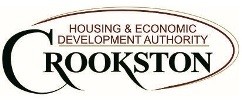The Crookston Housing and Economic Development Authority (CHEDA) Board met on Tuesday morning at Valley Technology Park, where they approved the 2020 CHEDA Budget. The budget includes a total income of $1,874,367 with expenses of $1,867,462.11 for a net income of $6,904.90.
The most significant change to the budget since the draft budget was released in September was that CHEDA’s stipend from the Crookston City Council didn’t include $15,000 for the Small Business Development Center (SBDC) said CHEDA Executive Director Craig Hoiseth. “The budget has been talked about in draft form since September, with a final version in October,” said Hoiseth. “The board chose to wait on it and now at the December meeting to approve the budget. The only thing that has changed since providing the budget drafts earlier this year has been the $15,000 toward the SBDC. The City Council did not fund that piece on our stipend, so we’ll have to adjust our budget accordingly.”
The Board also approved a resolution to take units offline at the Oak Court Housing Complex during each phase of the plumbing project throughout 2020 and approved an upgrade to cable tv services for the facility said, Hoiseth. “As we’re doing that plumbing project, we’re going to take off five, six, or seven units at a time,” said Hoiseth. “Rather than coming to the board every month to take them offline, we did a resolution today for the entire building. The resolution today took into account the entire year, so the entire facility has been authorized to take units offline for the plumbing to be installed. Secondly, the item was to put cable tv wiring throughout the building. Its old technology [currently], we figured while the walls are open, we’d run those cables internally and allow our residents to have the new cable tv provided by Midco locally. Also, the ability to put in high-speed internet, which they haven’t had up until this point.”
Midco will provide all the hardware for the project, and Red River Electric was the low bid for the installation of new wiring at $24,600. Hoiseth said the installation, a capital project on the Oak Court five-year plan, will be repaid to the Public Housing Capital Fund through a $10 surcharge to subscribing residents. “We have a capital fund program and a five-year plan,” said Hoiseth. “That’s been on the plan, and so the board is going to take the funds from that. As we provide the cable service to the tenants, they are going to have a choice if they will make a choice if they want the cable tv or not. We’re going to have an upcharge on it of $10 a month onto their monthly bill until we’re able to recapture the amount of money that we invest.”
The board also asked Hoiseth about three Rehab Housing Loans that are past due. Hoiseth told the board he has been working with the homeowners and hopes to wrap those repayments up by early 2020. “The Rehab Housing Program is designed that the loans be paid back within a calendar year when sold or rented, whichever comes first,” said Hoiseth. “There are three properties that have exceeded that year. All three of those owners are working on trying to either finish their house or get them financed through a bank and still selling it. We’ve been a little bit lenient on it. The board last year introduced some administrative fees in addition to the 2 percent [late fee]. We’re applying those fees administratively, and hopefully, we’ll be able to wrap them up here toward the end of the year or in January.”
Also included on the agenda was a discussion on the grants and finances for the B3 Grant program and a request by Functionally Fit. Commissioner Craig Morgan asked what the language of the program said regarding a change in ownership. Hoiseth said the language calls for a 50 percent repayment, but that if the assets purchased through the grant remain with the business, it is possible to forgo that. “There was a question because earlier this year, we provided a B3 grant for Daroos, and as you’re aware, Daroos is going to change ownership,” said Hoiseth. “So, as that business gets sold, the board inquired what we’ll happen with that B3 grant and what did the policy depicts. I believe we communicated that half of that grant would have to be repaid. And we just decided that if that asset that was purchased with that grant stayed with the business, with the building, we could probably forgo that. But certainly, we want to follow up on that.”
The Functionally Fit B3 Application, which requested funds to pay for a leak the building had experienced, didn’t qualify for the program Hoiseth told the board because the work had already been completed. Hoiseth asked the board whether they wanted to be notified when applications that didn’t qualify were received, and they said they did. The board also discussed making changes to the B3 program policies with Commissioner Tom Vedbraaten, saying he thought the focus of the program should go more towards marketing type improvements rather than building repairs. It was also discussed whether CHEDA should directly pay invoices to ensure the funds are going where they are intended, explained Hoiseth. “There was a grant application that was not allowable being as the expenditures had already been paid for prior to the application,” said Hoiseth. “And so, we want to look at those guidelines and policy to recommend a couple of changes. One of those changes might be that CHEDA is more actively engaged with the invoices that come in for the program itself. Because, if we are paying for advertising, CHEDA can write the check to KROX, Crookston Times, or other local media outlets easily enough, and make sure that the funds are being dedicated to the vendor they are specified as.”
The board will review possible changes to the B3 program in January. Hoiseth also notified the board that the house built in the Carmen View Development through a partnership with the Tri-Valley Opportunity Council (TVOC), the Northwest Minnesota Foundation, Northwest Multi-County HRA, and other partners had sold. “We’re excited to report the house down in Carmen View has been sold, the proceeds of which will be distributed,” said Hoiseth. “CHEDA and Kevin Ross each contributed $25,000 toward the project, and we’re going to reimburse some of those dollars. About the only haircut, we’re going to take is the cost of the lot itself. Kevin and CHEDA will both take a minimum loss on that. Ultimately the house did sell for what it was budgeted for, so we’re only taking a loss on the lot itself. We’re excited to put that new piece of property on the market. It’s already being lived on by a resident, and we’re excited to report that. My thanks out to the foundation, multi-county, the banking facilities, and Tri-Valley, who took the fiscal host with this and ran with it. Complements to Jason [Carlson, TVOC Executive Director] and his board for all their work getting this done for Crookston.”
Hoiseth also mentioned that the homeowner had purchased a second lot from Ross on which they plan to build a shed. The board had some discussion about not being in favor of that with Vedbraaten, saying that the tax base for sheds is considerably less than houses. Commissioner Paul Eickhof added that he wasn’t in favor of sheds in residential neighborhoods, stating that he thinks some of the large sheds in the northeast corner of town look terrible. Acting Mayor Dale Stainbrook also said he wasn’t impressed with other sheds on the south end of town. Hoiseth told the board that he doesn’t believe there is anything in the city code that prohibits a garage or shed from being the main structure on a residential property, adding after the meeting that he thinks it is a marketable attribute. “When someone buys a lot in a residential area in Crookston, I believe, there is nothing that prohibits them from putting up a garage on that lot,” said Hoiseth. “There was some discussion we’d like to see more houses rather than garages built because houses provide a little more property tax base. But, let’s face it, the market on the outskirts of town are essentially rural living inside our community. The people that are there like to have that extra shed, so rather than having a three-car garage, they have a two-car garage with a garage being built on the lot adjacent. I certainly don’t see it as a problem, but the discussion was centered around are we building up enough property tax base for the development. Particularly as we put in infrastructure such as water, roads, sewer, that comes with a significant cost and are we getting our payback quick enough with that type of development. My answer is yes. I think it’s a win for Crookston. That development is going to be unique, and I hope Kevin is able to further that type of housing with an outdoor shed, garage, or workshop. I think that’s a good attribute and something that’s very marketable.”
The board also held a closed-door discussion to discuss three parcels – 80.03751.00, 82.0013.01, and 82.00162.17.
Tags:



